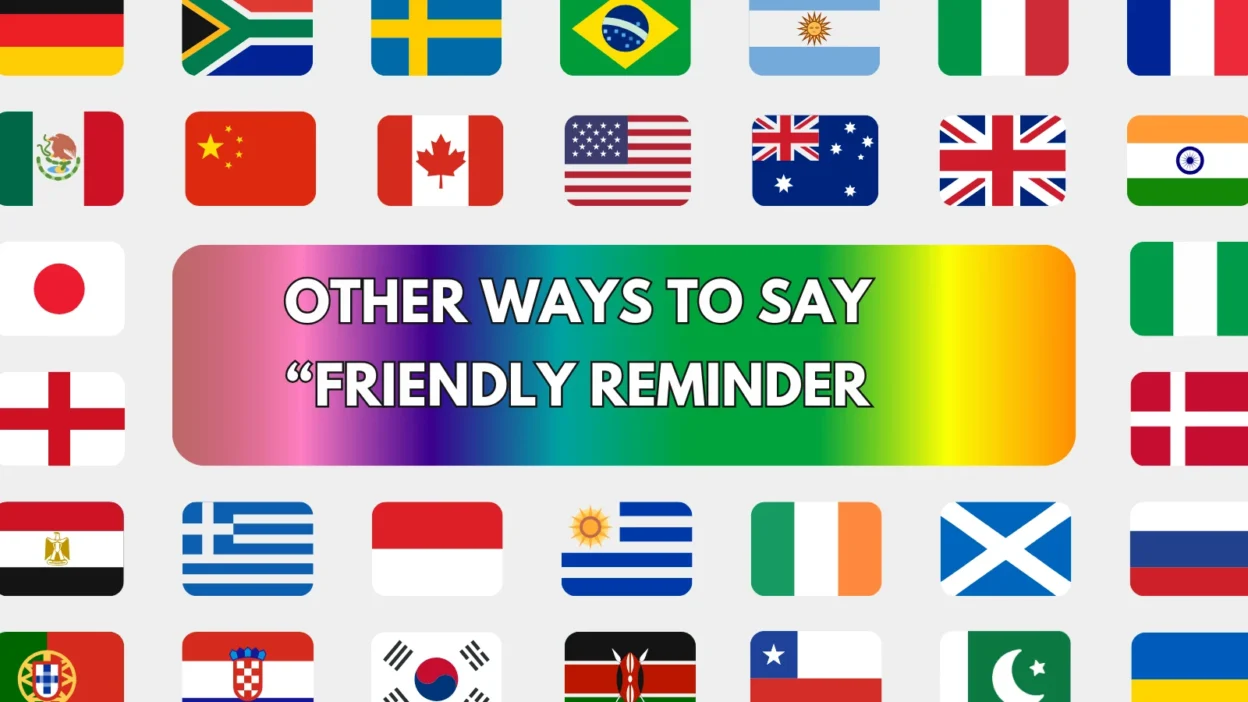The phrase “friendly reminder” is commonly used in emails and messages to gently nudge someone without sounding pushy. While it’s a helpful phrase, using it too often can feel repetitive or insincere. Whether you’re writing to a colleague, client, or team member, switching up your language can keep your communication fresh, polite, and effective.
Here are 25 thoughtful alternatives to “friendly reminder”, complete with clear explanations and examples to help you find the perfect fit for every situation.
1. Just a Quick Note
Meaning:
A short message to bring something to someone’s attention.
Detailed Explanation:
This casual phrase sounds light and respectful, ideal for reminders that aren’t urgent.
Scenario Example:
Just a quick note that our meeting is tomorrow at 10 AM.
Best Use:
Emails, informal messages, soft nudges.
Tone:
Casual, polite.
2. Kindly Note
Meaning:
Please be aware of the following information.
Detailed Explanation:
More formal and respectful, often used when communicating policies or instructions.
Scenario Example:
Kindly note that the deadline for submissions is Friday.
Best Use:
Professional emails, policy updates.
Tone:
Polite, formal.
3. Please Remember
Meaning:
A gentle request to recall important information.
Detailed Explanation:
Direct but still soft, it’s useful for reminders where action is required.
Scenario Example:
Please remember to submit your feedback by end of day.
Best Use:
Task reminders, internal communication.
Tone:
Respectful, clear.
4. Don’t Forget
Meaning:
Encourages someone to remember something.
Detailed Explanation:
More informal and friendly, but can sound too blunt if overused.
Scenario Example:
Don’t forget to bring your ID for building access.
Best Use:
Friendly chats, casual work settings.
Tone:
Direct, conversational.
5. A Gentle Nudge
Meaning:
A soft prompt or follow-up message.
Detailed Explanation:
Imparts a friendly, non-pressuring tone—great for following up without urgency.
Scenario Example:
Just a gentle nudge to check in on the status of the proposal.
Best Use:
Follow-ups, polite reminders.
Tone:
Warm, courteous.
6. Quick Heads-Up
Meaning:
An early or short warning or update.
Detailed Explanation:
Best used for upcoming deadlines or events.
Scenario Example:
Quick heads-up: the system will be down for maintenance tonight.
Best Use:
Tech updates, casual notifications.
Tone:
Informal, helpful.
7. For Your Awareness
Meaning:
Bringing something to someone’s attention.
Detailed Explanation:
Professional and non-intrusive, useful for information-sharing.
Scenario Example:
For your awareness, the schedule has been slightly adjusted.
Best Use:
Internal updates, formal writing.
Tone:
Neutral, informative.
8. May I Remind You
Meaning:
A polite way to prompt someone about something.
Detailed Explanation:
Slightly more formal, suitable for professional follow-ups.
Scenario Example:
May I remind you that your response is due tomorrow?
Best Use:
Work emails, formal messages.
Tone:
Polite, formal.
9. As a Reminder
Meaning:
Used to repeat previously shared information.
Detailed Explanation:
Neutral and professional, often used at the start of a sentence.
Scenario Example:
As a reminder, all reports must be uploaded by Friday.
Best Use:
Professional communication, announcements.
Tone:
Clear, objective.
10. This Is a Quick Follow-Up
Meaning:
Used to reconnect or check on progress.
Detailed Explanation:
Professional and respectful, good for checking in on a task.
Scenario Example:
This is a quick follow-up on the invoice sent last week.
Best Use:
Email threads, project management.
Tone:
Professional, polite.
11. A Quick Check-In
Meaning:
To see if someone needs help or is progressing.
Detailed Explanation:
Friendly and encouraging, often implies support.
Scenario Example:
Just a quick check-in—let me know if you have any questions.
Best Use:
Team updates, casual work environments.
Tone:
Supportive, casual.
12. Prompting You Gently
Meaning:
A soft way to encourage action.
Detailed Explanation:
Poetic and kind, best used with people you know well.
Scenario Example:
Just prompting you gently in case it slipped your mind.
Best Use:
Personal messages, creative writing.
Tone:
Kind, expressive.
13. Circling Back On
Meaning:
Returning to a previous topic or conversation.
Detailed Explanation:
Helpful for revisiting unanswered emails or missed tasks.
Scenario Example:
Just circling back on the request from earlier this week.
Best Use:
Email follow-ups, business communication.
Tone:
Professional, respectful.
14. Just Following Up
Meaning:
Checking in on something previously mentioned.
Detailed Explanation:
Very common, but useful and neutral—perfect for any audience.
Scenario Example:
Just following up to see if you had a chance to review the document.
Best Use:
General follow-ups, business or client emails.
Tone:
Neutral, polite.
15. Kindly Be Advised
Meaning:
Used to inform the recipient in a formal tone.
Detailed Explanation:
More structured and professional, works well for notices.
Scenario Example:
Kindly be advised that the office will close early tomorrow.
Best Use:
Formal announcements, policy memos.
Tone:
Authoritative, polite.
16. Keep in Mind
Meaning:
A helpful mental note or suggestion.
Detailed Explanation:
Casual, and best for reminders involving decisions or planning.
Scenario Example:
Keep in mind that parking is limited at the venue.
Best Use:
Planning tips, team messages.
Tone:
Conversational, soft.
17. Just Checking In
Meaning:
To politely ask for an update or response.
Detailed Explanation:
Sincere and unobtrusive, ideal for nudging without pressure.
Scenario Example:
Just checking in to see if you’ve had a chance to look over the brief.
Best Use:
Friendly emails, work check-ins.
Tone:
Warm, easygoing.
18. A Kind Reminder
Meaning:
A gentle way to bring attention to something.
Detailed Explanation:
Nearly identical to “friendly reminder,” just slightly more formal.
Scenario Example:
A kind reminder to submit your survey by Monday.
Best Use:
Newsletters, event planning, polite emails.
Tone:
Cordial, formal.
19. Polite Prompt
Meaning:
A soft and respectful nudge.
Detailed Explanation:
Very professional, but with an undertone of urgency when needed.
Scenario Example:
This is just a polite prompt regarding the upcoming deadline.
Best Use:
Workplace reminders, client communications.
Tone:
Polished, subtle.
20. Allow Me to Remind You
Meaning:
Gives permission to restate an important fact.
Detailed Explanation:
Slightly old-fashioned but highly respectful.
Scenario Example:
Allow me to remind you that your appointment is scheduled for tomorrow.
Best Use:
Formal messages, customer care emails.
Tone:
Refined, respectful.
21. In Case You Missed It
Meaning:
Refers to previously shared information.
Detailed Explanation:
Great for newsletters or announcements.
Scenario Example:
In case you missed it, our early registration ends tonight.
Best Use:
Marketing emails, company updates.
Tone:
Casual, friendly.
22. To Refresh Your Memory
Meaning:
Used to help someone recall important information.
Detailed Explanation:
Slightly humorous or casual—best with people you know.
Scenario Example:
Just to refresh your memory, here are the notes from last week.
Best Use:
Friendly reminders, team settings.
Tone:
Lighthearted, personal.
23. As Mentioned Previously
Meaning:
Restating something that was shared earlier.
Detailed Explanation:
Very professional, especially in formal writing.
Scenario Example:
As mentioned previously, all reports are due by Friday.
Best Use:
Official communication, reports.
Tone:
Formal, structured.
24. A Courteous Reminder
Meaning:
A polite way to prompt someone without sounding firm.
Detailed Explanation:
Well-suited for professional follow-ups where tone matters.
Scenario Example:
This is a courteous reminder that your subscription expires soon.
Best Use:
Client emails, notices.
Tone:
Gracious, professional.
25. A Prompt Reminder
Meaning:
A timely message to keep something top of mind.
Detailed Explanation:
Efficient and respectful—implies the action is time-sensitive.
Scenario Example:
Just a prompt reminder that tomorrow is the last day to register.
Best Use:
Time-sensitive updates, deadlines.
Tone:
Clear, polite.
Conclusion
Saying “friendly reminder” works well, but variety adds professionalism and clarity. These 25 polite and creative alternatives can help you sound more thoughtful, respectful, or engaging—depending on your audience and intent. Whether you’re managing a team, coordinating events, or sending polite nudges, the right phrase makes all the difference.

Hadi Bhatti is a passionate writer and content creator at Saypadia, known for turning complex words, phrases, and internet slang into simple, easy-to-understand explanations. With a strong interest in language, meanings, and digital communication, Hadi focuses on helping readers understand what words really mean in everyday use. His writing style is clear, engaging, and user-focused, making learning both practical and enjoyable.




